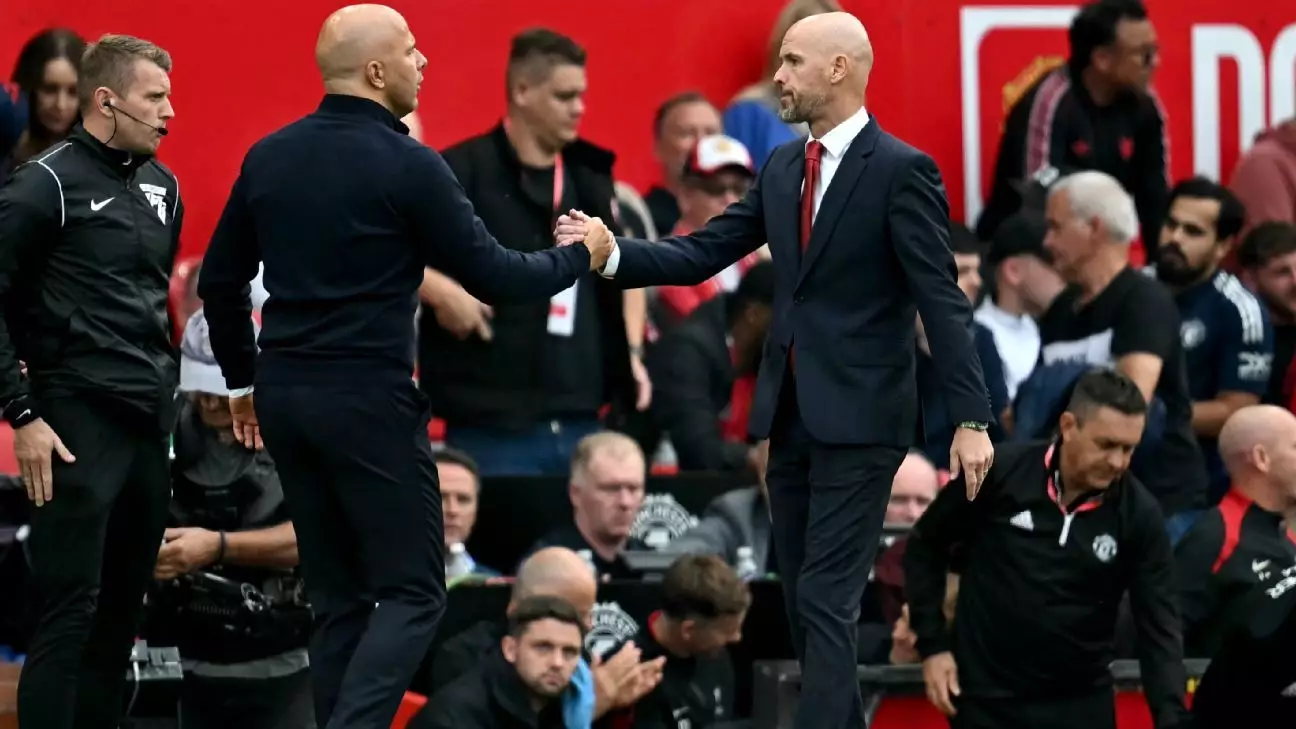The footballing world is abuzz following the recent dismissal of Erik ten Hag from his position as Manchester United’s manager. The news came as a shock to many, yet it also sparked various reactions from his contemporaries in the Premier League. Ten Hag’s tenure, which spanned two and a half years, culminated in a disappointing 2-1 defeat to West Ham, leaving the club languishing in 14th place in the league table. With such turbulence, the football community is grappling with the implications this decision carries not only for Ten Hag but also for Manchester United as a whole.
The immediate response from rival managers has been one of sympathy and understanding. Arne Slot, the Liverpool boss, expressed his disappointment over Ten Hag’s exit, calling it “a pity” and emphasizing the emotional weight that such a situation carries for fellow Dutch nationals. This sentiment was mirrored by Manchester City’s Pep Guardiola, who remarked that the unpredictable nature of managerial jobs often leads to drastic decisions, placing immense pressure on coaches to produce results swiftly.
Guardiola’s reflection on the job security of managers spotlights an uncomfortable truth in football—while other professionals may retain their roles despite setbacks, managers find themselves in a precarious position where performance dictates their future. For Ten Hag, the pressure was amplified not only by the club’s dismal league position but also by the lack of European success over the past year, resulting in a dire set of circumstances that ultimately led to his dismissal.
Despite his exit, Ten Hag’s achievements during his time at Manchester United should not be overlooked. Mikel Arteta, Arsenal’s manager, highlighted the silverware Ten Hag secured, most notably the Carabao Cup and FA Cup. Arteta acknowledged the broader challenges that accompany managerial positions, particularly within clubs as storied as Manchester United. The contrast between Ten Hag’s earlier successes, particularly at Ajax where he transformed the team’s fortunes, and his struggles at Old Trafford, serves as a poignant reminder of the volatility that can characterize a managerial career in football.
As Arteta noted, the media scrutiny that managers face can be relentless, and unfortunate matches like the one against West Ham can change the trajectory of a coach’s career overnight. The critical nature of performance, combined with football’s inherent unpredictability, creates an environment where even successful managers can find themselves at an impasse.
The Inevitable Cycle of Management
Interestingly, Ange Postecoglou’s insights on the inevitability of Ten Hag’s sacking resonate with many in the football community. While the news may be disconcerting, it aligns with a broader trend where managerial changes are almost routine, especially for clubs with high expectations like Manchester United. This cycle raises questions about the sustainability of such a high-stakes environment, where victories are demanded, and failure often leads to immediate consequences.
This relentless cycle not only affects managers but also the clubs themselves. The search for a new manager represents a critical turning point for Manchester United and could either revitalize the team or plunge it deeper into crisis. Reports suggest that the club is closely eyeing Sporting CP’s Rúben Amorim as a potential successor. Amorim’s substantial release clause adds yet another layer of complexity, hinting at both the financial stakes involved and the pressure on United to make a prompt decision.
The sacking of Erik ten Hag sheds light on the ever-changing landscape of football management. While sympathy flows from fellow managers, the reality remains stark—performance determinations shape careers, often leaving little room for sentiment or second chances. As Manchester United embarks on yet another leadership search, the stakes continue to rise, leaving fans and analysts alike to ponder the future of one of football’s most historic clubs. Ultimately, Ten Hag’s dismissal serves as a cautionary tale about the fleeting nature of success in the sport, reminding us that today’s triumph can quickly turn into tomorrow’s disappointment.

